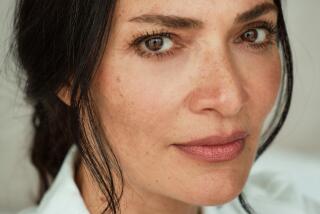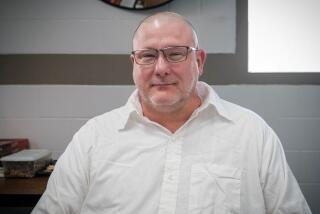Broderick Finds Jail Soothing, Considers Cutting Deal
- Share via
Four months removed from her murder trial, La Jolla socialite Elisabeth Anne (Betty) Broderick would like the world to know that she is doing fabulously well in jail.
“It’s been wonderful,” she said. “Just what I needed.”
No responsibilities, no bills, no gardeners to worry about, no dishes to do, she said. Just rest and relaxation.
“I’m very slowly but steadily turning into a human being that functions again,” she said. Her weight, which ballooned in the first few months after she killed her ex-husband and his second wife, “is steadily going back to the place I’ve always been,” she said.
So if she has to spend the rest of her life in prison, so be it, Betty Broderick said in a 45-minute phone interview Friday from the Las Colinas Jail in Santee.
But she said she would rather do something constructive, like working with children. Better yet, of course, would be to get out of jail and to spend time with her own kids, she said.
She said she’s terribly frustrated at not being able to see her two youngest children. She said she talks often to her oldest two, grown daughters, but is forbidden by the courts from talking with her 12- and 15-year-old sons and misses them fiercely.
With a hearing set for Wednesday to confirm the Aug. 5 date for a second trial, Betty Broderick said she has begun to consider cutting a deal with prosecutors.
“I’m surveying the kids,” she said.
After a family spring-break get-together next week in Florida, “they’re going to tell me what they want--how many years it is that won’t drive me crazy if I’m in,” meaning how long they can tolerate her being behind bars.
“Because if they don’t care, I don’t care” if it’s life in prison, she said. “But if they want me out, and I’m in prison, I’ll care.”
She added, “I have a definite point of view on what I’d take. I’m a very reasonable person.” She declined to elaborate.
Her defense lawyer, Newport Beach attorney Jack Earley, said Friday that he, too, is interested in dealing. He said that a second trial, or any number of trials, might end in mistrial, just as the first one did on Nov. 20.
“I think this is the kind of case that could hang up a bunch of times,” Earley said. “Obviously, it costs hundreds of thousands to do it. It’s in everyone’s interest to resolve it. And so we’re going to still explore it.”
Earley declined to reveal details, but said the defense already has made one offer, which was rejected.
Deputy Dist. Atty. Kerry Wells said Friday that she remains ready to entertain another.
“As far as negotiations in homicides, the ball is always in the defense court to begin with,” Wells said.
Betty Broderick, 43, faces two counts of murder. On Nov. 5, 1989, she shot to death her ex-husband, Daniel T. Broderick III, and his second wife, Linda Kolkena Broderick.
Daniel Broderick was a prominent medical malpractice attorney and a former president of the San Diego County Bar Assn. Linda Kolkena Broderick was his office assistant.
She testified at her first trial that she fired the shots that killed her ex-husband and his wife.
The issue in the case is whether Betty Broderick had the premeditation the law requires for first-degree murder. She maintains she intended only to confront him and kill herself when she stole into his house before dawn on Nov. 5, 1989.
When Betty Broderick’s first trial ended Nov. 20, the jury had deadlocked, 10 for murder, two for manslaughter. That first trial generated as intense, personal interest as any other trial in recent San Diego history.
One television station, KNSD (Channel 39), interrupted the daily diet of talk shows for live coverage of Broderick’s first trial in San Diego County Courthouse.
Now it’s been four months since the trial ended. The Gulf War has come and gone. And the Broderick case continues to draw intense attention.
Betty and Daniel Broderick’s oldest daughter, Kim, visited her mother recently at the jail, where Broderick has remained since she surrendered the day of the killings.
“When Kim was here, she said she was out and about and heard more about me than the war,” Betty Broderick said. “I think it’s a phenomenon. I don’t understand it.”
“It makes me feel weird,” she said.
A lengthy article this month in Ladies’ Home Journal rehashes the case. Entitled “Hell Hath No Fury,” it tells the story of Daniel and Betty Broderick’s bitter divorce and how Betty Broderick went from high society to jail.
The title of the magazine article, Betty Broderick said, made the case seem like it was about revenge and jealousy. She sees it differently and has contended that, during and after the divorce, which ended in early 1989, Daniel Broderick used his legal influence to cheat her out of her children and a fair share of his seven-figure income.
“Maybe I am blinded to a degree, but I don’t think revenge and jealousy came out at the trial,” she said.
“That was the kind of thing that everybody wanted to believe it was at the beginning,” when she was first arrested, she said. “But that had nothing to do with it. Leaving me for a younger woman. That had nothing to do with what happened subsequently.”
Betty Broderick said she has “never been jealous of Linda Kolkena for a moment in my life. Ever. I’m not jealous of her. Never was. In fact, I looked down my nose at her.”
Betty Broderick testified at the first trial that she believed her husband began an affair with Linda Kolkena in 1983. The divorce was final in early 1989--six years later.
If she were truly motivated by jealousy and revenge, Betty Broderick said, things would have been a lot different.
“I’d tie them up where they couldn’t move, and I’d torture them every single day and single night for six years,” she said.
“I’d leave them at night where no one could hear them screaming, come back and give them cigarette burns and kick them, like torturers do,” she said. “Because that’s what it felt like they were doing to me.”
The magazine article is likely to bring even more mail. Even without her name in headlines every day, Betty Broderick still gets about 250 letters a month, many from sympathetic women.
“I get more than five a day,” she said. “From Australia, the Philippines, from weird countries that somehow have picked up this story.”
“I have so many people offering to do anything for me,” she said. “They offer underwear, fudge, money, brownies. ‘Anything I can do for you, let me know, let me know.’ ”
Many of her correspondents have bought her magazine subscriptions, she said. “Lear’s, Glamour, Vogue, Vanity Fair, New York Woman. Reader’s Digest, which I love to read. Smithsonian is fabulous.”
She had too many books and magazines last month and was sent to lockdown, a special cell where she remains alone, for 10 days. She just got out Wednesday, she said.
“I love it in lockdown,” she said. “It’s bigger, it’s quieter. I can exercise. They hate that,” she said, referring to jailers. “They’re trying to make you unhappy.”
When she came out of lockdown, there were more letters still. The television talk shows write. She keeps turning them down. The movie producers write. She refuses them, too.
Visiting hours at the jail begin some days at 6 in the morning, and one producer said he would be by at the crack of dawn this weekend, she said. “I don’t know why he’s coming,” she said. “I’ve said, ‘No,’ a hundred times.”
It’s just easier, she said, to keep the world at bay.
“It’s the lack of stress, continual, relentless stress,” she said. The divorce battle felt like “having alarms and bells and sirens going off in your head nonstop for years. It really wears you down.
“Then I had depression besides. It felt like, ‘Emergency, emergency, bells, bells, lights, lights, save yourself, save yourself.’ I was trying to save myself every way I could think of but nothing was happening.”
The day of the killings, she said, she was “over the edge, into the dark oblivion of craziness. All I needed was somebody to say, ‘Don’t worry, Betty, I’ll take care of this for you.’ ”
That’s what has happened in jail, she said.
“This is a vacation, if you can look at it this way,” she said. “I needed a rest. I needed a sanitarium. I just needed a rest. I’m very slowly but steadily turning into a human being that functions. I talk, I remember, I read a book, it goes into my brain.”
That’s why life in state prison holds no fear, she said.
“I think about (prison) as a country club. A tennis court, a swimming pool, you walk around, no stress, no responsibility. I wouldn’t have to worry about getting my car fixed. I can read, I can converse with people, I can write.
“It’s early retirement,” she said. “But what a waste. I’m too young to waste like that.”


